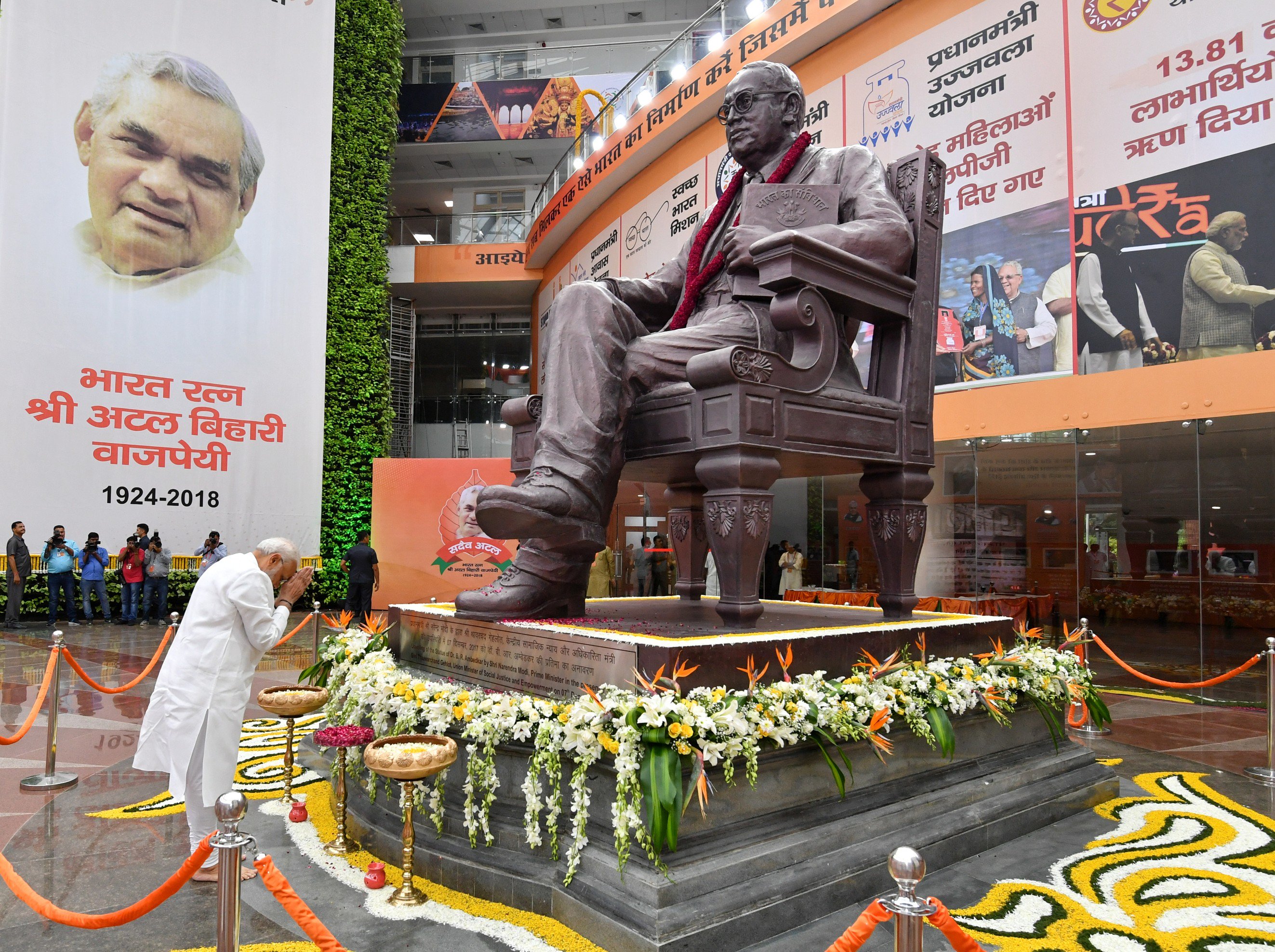A proposal to install a statue of Dr. B.R. Ambedkar at the Gwalior Bench of the Madhya Pradesh High Court has snowballed into an intense legal and ideological battle among practicing lawyers. What was meant to be a tribute to the father of the Indian Constitution has now become the center of a prolonged standoff that has disrupted court routine and sparked media attention.
The Proposal: Honouring Ambedkar Within Court Premises
In February 2025, a group of lawyers submitted a formal request to the High Court administration seeking permission to erect a statue of Dr. Bhim Rao Ambedkar within the court complex. According to Advocate Vishwajit Ratonia, who is among the leading voices supporting the statue, the proposal received administrative clearance through a committee designated to examine such matters.
Following approval, the Public Works Department was engaged, and a local sculptor was hired. An advance of ₹2 lakh was paid to begin crafting the statue.
Opposition Mounts: National Flag Site at Center of Dispute
Despite procedural clearance, not all lawyers were on board. A faction led by Advocate Anil Mishra has opposed the move, citing that the site chosen for the statue is traditionally used to hoist the national flag.
“The place chosen holds national significance. Installing a statue there undermines the symbolism of our Tricolour,” argued Mishra.
To underline their protest, the opposing group hoisted the national flag at the proposed statue location earlier this week, symbolically reclaiming the space and intensifying the conflict.
Sit-Ins, Slogans, and Silent Dissent
Both camps have since launched daily protests. Lawyers supporting the installation have organized sit-ins and symbolic marches within the court premises, while the opposing faction has resorted to silent demonstrations and press briefings.
This internal courtroom drama has attracted attention not only from legal circles but also from civil society groups and political observers. While the issue remains confined to the court campus for now, the tension continues to simmer.
Why Ambedkar’s Statue Matters in Indian Courts
Dr. Ambedkar is widely celebrated as the principal architect of the Indian Constitution and a global icon of social justice and equality. His statues are common in public institutions, especially educational and legal settings.
In 2023, President Droupadi Murmu unveiled a statue of Dr. Ambedkar at the Supreme Court of India, marking a historic first. Supporters of the Gwalior proposal argue that the Madhya Pradesh High Court, too, should honour his legacy in a visible and dignified manner.
Legal Loopholes and Grey Areas
The controversy has also exposed administrative loopholes in the High Court’s internal policies regarding public memorials. The absence of clear guidelines about designated spaces for flags and statues has added fuel to the fire.
Moreover, questions are being raised over the use of public funds and the advance paid to the sculptor, should the plan be shelved or relocated.
A Middle Path: Is Compromise Possible?
Legal experts and senior members of the Bar Association have begun urging both factions to seek a middle path. Suggestions include:
- Installing the statue at an alternative location within the court complex
- Erecting a dual monument that includes both the national flag and the statue in close proximity
- Awaiting a formal judicial or administrative order to settle the matter permanently
So far, no official intervention has been announced by the Chief Justice or High Court registry.
Timeline of Events
- Feb 2025: Application submitted to install Dr. Ambedkar’s statue
- March 2025: Committee approves proposal; sculptor hired, ₹2 lakh paid
- April 2025: Lawyers’ protests begin; opposition cites national flag space
- May 2025: National flag hoisted at statue site; protests intensify
What’s at Stake: Symbolism, Space, and Statutes
This controversy is not just about a physical statue—it’s about the symbolism of space in India’s judiciary. For the pro-statue camp, it is about affirming Ambedkar’s place in legal history. For the opposing group, it’s about preserving the sanctity of national symbols like the flag.
As the situation unfolds, the legal community—and the country—waits for a verdict not from the courtroom, but from consensus.
An Issue That Deserves Resolution, Not Polarization
The Ambedkar statue dispute at the Madhya Pradesh High Court’s Gwalior Bench reflects a deeper ideological struggle over representation, heritage, and institutional decorum. Rather than deepening divisions, this moment could serve as an opportunity for reflection and resolution—guided by the very constitutional values that Dr. Ambedkar fought for.


